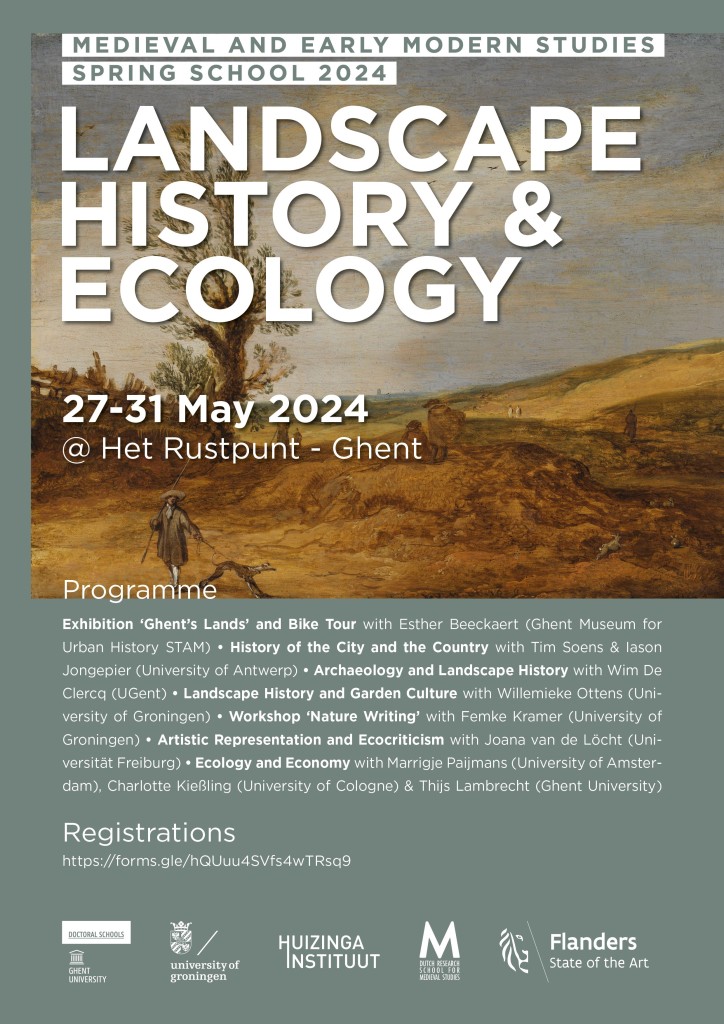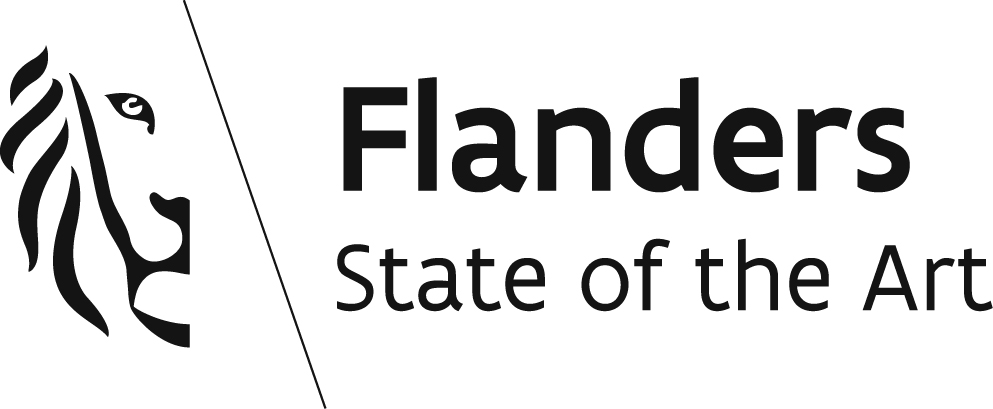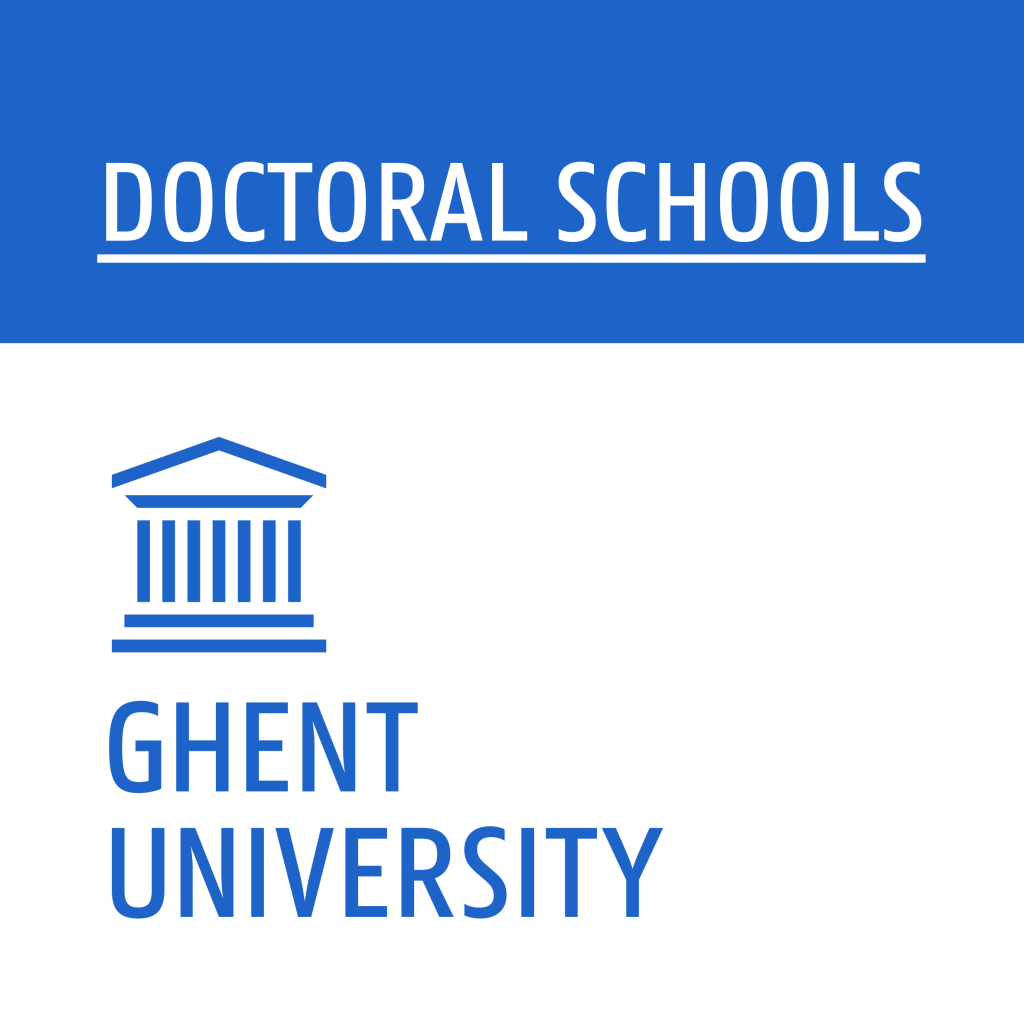Landscape History & Ecology – Ghent, 27-31 May 2024

This Spring School is organised by Ghent University (Doctoral Schools), University of Groningen, the Huizinga Institute and the Dutch Research School for Medieval Studies to stimulate contacts and exchange between PhD candidates and ReMa students in the field of cultural history, art history, historical geography, urban history, archaeology, early modern history, medieval history, literary studies, environmental psychology, environmental design and engineering, sustainability studies and environmental education. The course will mainly focus on the Middle Ages and the Early Modern Period, but students working on Antiquity or the Modern Period can attend as well.
Topic
Climate change, depletion of natural resources, loss of natural and cultural landscapes, and many other (ecological) sustainability challenges urge us to (re)evaluate human interaction with the natural world. This renewed environmental consciousness has invigorated not only scientists working on effects in the present and solutions for the future, but also those who study the (distant) past. It has become clear that we need to take the story back(much) further than the industrialisation of the second half of the eighteenth century. Specifically in medieval and early modern studies, scholars have uncovered the deep historical backgrounds of the anthropogenic ecological challenges, including (over)exploitation of natural landscapes, diminishment of open space, deforestation, food production, use of energy and water, fauna and flora extinctions et cetera. Over the past decades, ever more research has been conducted into the ecological impact and implications of practices in different landscapes. Also the traces of environmental mentalities in art and the cultural representation of human interactions with the environment is a flourishing field, strongly influenced by ecocritical approaches. The Spring School will therefore pay attention to a wide range of ecological issues in history related to the landscape of city, country and colony and their mediation in cultural production, most notablyliterature and art. It combines a focus on the medieval and early modern period with an multidisciplinary perspective, attending to the theoretical and methodological background of landscape and cultural history, ecocriticism and archaeology.
Approaches
This course takes four topics and methodologies related to historical landscape and ecology as a starting point:
(A) History of the city and the country,
(B) Archaeology and landscape history,
(C) Artistic representation and ecocriticism,
(D) Ecology and economy.
Ten specialists will reflect from their scholarly background (landscape history, archaeology, literary studies, cultural history) on ecological issues in their own research. An accompanying reading list gives rise to further reflection and discussion with the participants. This will offer students a framework to think theoretical concepts and methodologies through in relation to their own work. Through short pitches the attending PhD students will reflect on the possibilities and difficulties of working with the same concepts and methodologies in their own research projects. A guided bike tour on the ecology of the city Ghent and its surroundings will be part of the programme, as well as an excursion to the Zwin-region and Zeeland Flanders, with presentations and discussions ‘in the field’.
Programme
Session I: Visit Exhibition ‘Ghent’s Lands’ & Bike Tour – Guide: Esther Beeckaert (Ghent Museum for Urban History STAM)
Session II & III: History of the City and the Country- Lecturers: Tim Soens & Iason Jongepier (UAntwerpen)
Session IV: Archaeology and Landscape History – Lecturer: Wim De Clercq (UGent)
Session V: Landscape History and Garden Culture – Lecturer: Willemieke Ottens (Rijksuniversiteit Groningen)
Session VI: Workshop ‘Nature Writing’ – Lecturer: Femke Kramer (Rijksuniversiteit Groningen)
Session VII: Artistic Representation & Ecocriticism – Lecturer: Joana van de Löcht (Universität Freiburg)
Session VIII & IX: Ecology and Economy – Lecturers: Marrigje Paijmans (University of Amsterdam), Charlotte Kießling (University of Cologne) & Thijs Lambrecht (Ghent University)
Registration
PhD students and ReMa students are invited to register for this course before 12 January 2024 through the following link: https://forms.gle/hQUuu4SVfs4wTRsq9 Please note that there is a limited number of places available for this course. After your registration you will soon receive more information about whether your registration can be confirmed or not. Some of the participating graduate/doctoral schools will cover tuition and lodging for their participating members (please wait for more information after your registration).
Organising institutions and partners
This Spring School is organised by Ghent University (Doctoral Schools), the University of Groningen, the Huizinga Institute and the Research School for Medieval Studies in cooperation with the following research groups: the Group for Early Modern Studies (UGent), the Henri Pirenne Institute for Medieval Studies (UGent), the Amsterdam Centre for Studies in Early Modernity (UvA), the Groningen Research Institute for the Study of Culture (Rijksuniversiteit Groningen), the Centre for Urban History(UAntwerpen), the Institute for Early Modern History (UGent-VUB) and the Onderzoeksgroep Nieuwe Tijd (KU Leuven). The Spring School was also made possible by the Rudolf Agricola School for Sustainable Development (University Groningen).
Organising committee
Caroline Baetens, MA (UGent, Group for Early Modern Studies), Dr. Femke Kramer (Rijksuniversiteit Groningen, Research Institute for the Study ofCulture), Dr. Stefan Meysman (UGent, Pirenne Institute for Medieval Studies), Dr. Marrigje Paijmans (UvA, Amsterdam Centre for Studies in Early Modernity), Prof. Jeroen Puttevils (UAntwerpen,Centre for Urban History), Prof. Hanneke Ronnes (UvA / Rijksuniversiteit Groningen, Landscape History), Prof. Kornee van der Haven (UGent, Group for Early Modern Studies)










You must be logged in to post a comment.